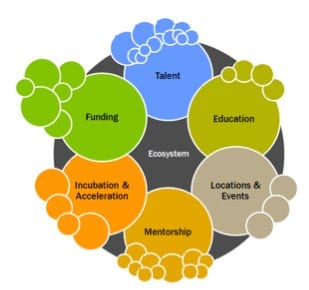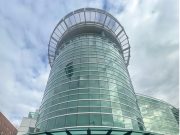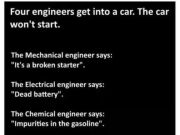Creating a new company is an incredibly difficult endeavor. It takes perseverance, stamina, and stubbornness, to push through the tens of thousands of decisions, and the repeated bouts of pushback, negativity and angst. Despite the difficulty, many thousands of people each year begin their efforts and launch multiple thousands of new ventures.
Most of these people find help along the way, in a vast variety of forms, from support by friends and family, to classes at schools and institutions, or formal help at business incubators. This help, along with investors, mentors, and others comprise a startup “ecosystem”.
Creating a thriving startup ecosystem requires at least six components.
 1- Talent
1- Talent
This pool of talent needs to extend well beyond the entrepreneurs starting the companies, including others with a variety of talent and experience in product, design, marketing, sales, etc. who are willing to join new startups and help them grow and thrive.
2- Education
This talent pool is ideally created and augmented locally, at universities and other learning institutions. Better still if these institutions themselves draw in talent, to seed the ecosystem with the latest knowledge.
3- Locations and Events
Ecosystem flourish when ideas are shared. Ideas are more readily shared when startups and their staff are co-located in a single neighborhood, when startups physically meet up at events, when there are common physical locations where people often gather.
4- Mentorship
When these shared ideas include lessons from experienced mentors, fewer mistakes are made by the new entrepreneurs, leading to more successes. This sharing from “generation” to generation can kick off a virtuous cycle turning a community into a true ecosystem.
5- Incubators and Accelerators
A tool which combines talent, education, location, and mentorship is a business incubator/accelerator. These institutions provide a centralized program to draw in talent, to bring the talent together in a single location, and to provide the necessary education and mentorship to help first-time entrepreneurs speed their way into the market.
6- Funding
Most new ventures require funding to reach profitability. While it is possible to import the necessary funding from elsewhere, the final component of a thriving startup ecosystem is local funding, ideally recycled from the successes of the previous generations of entrepreneurs, who truly understand the complexity and difficulty of creating successful startups.
A Virtuous Cycle
When these six components are combined, a virtuous cycle begins wherein new entrepreneurs find the training, help, and funding required to get started. They in turn help their peers and the next generations of entrepreneurs, who continue the cycle forward.
None of this is new. Ecosystems of craftsmen date back to the antiquities. Ecosystem in the last 500 years include Venetian glassmakers of the 14th Century, Swiss watchmakers of the 16th Century, and British steam engines of the 18th Century.
In more modern times, we have the “tech” ecosystem centered in and around San Francisco (a.k.a. Silicon Valley). The talent pool began with Hewlett Packard (1939) and Fairchild Semiconductor (1957) and includes Stanford University and UC Berkeley as key educational institutions. Today this is a multi-billion dollar ecosystem, containing companies like Apple, Google, and Facebook, and the virtuous cycle of “The Valley” is unmatched anywhere in the world. But one should remember that this cycle began over sixty decades ago, when most of the valley was orchards and farmland, and that no one person or small group of people set out to create this center of excellence.
However, with the hindsight of these historic examples, many people today are consciously organizing to purposefully create ecosystems in their cities. For example, in Seattle, all six components now exist to create an ecosystem for “sustainable” business, a.k.a. social enterprises, a.k.a. high-impact ventures, a.k.a. “conscious” companies. In October, four organizations are co-locating into a single building, The Center for Impact and Innovation: Bainbridge Graduate Institute, HUB Seattle, Fledge, and Social Venture Partners. The expectation is that such a concentration of social and environmental consciousness will draw in yet-more talent, more mentors, and more funding, setting off a virtuous cycle to create not only a business ecosystem, but to help the planet’s biological ecosystem as well.
About Michael “Luni” Libes – http://about.me/luni
Luni is a 20+ year serial entrepreneur, founder/co-founder of five companies. His latest startup is Fledge, the “conscious company” incubator. In addition, Luni is Entrepreneur in Residence and Entrepreneurship Instructor at Bainbridge Graduate Institute, and an Entrepreneur in Residence Emeritus at the University of Washington’s Center for Commercialization. Luni is author of The Next Step: Guiding you from idea to startup.





















